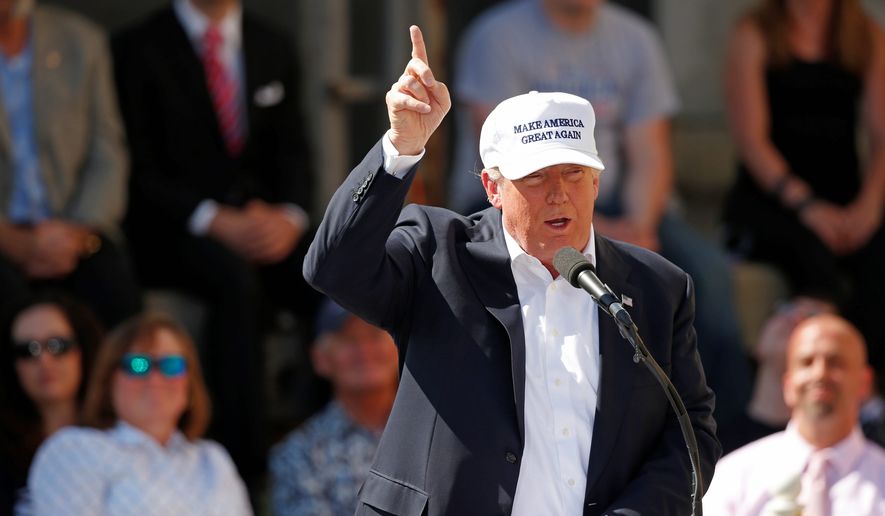OPINION:
Donald Trump is peddling a long-held, left-wing, labor union trade policy that will hike consumer prices, kill jobs and further weaken our economy.
In a desperate appeal to traditionally Democratic rank and file, working class voters, he wants to impose huge tariffs on imported goods and end the North American Free Trade Agreement begun by President Reagan in the 1980s and expanded by President Clinton in the 1990s.
Both presidents left office, after two terms, with strong approval from voters for their handling of the economy.
In Mr. Reagan’s case, it was due to his pro-growth, pro-job, across-the-board tax cuts that ended a severe recession in two years, but also free trade policies he championed throughout his political career.
His global trade plan began with our largest and closest trading partner, Canada, but he made clear that the next expansion would be with Mexico.
America held a referendum on his economic and fiscal policies in 1984 when he won in a 49-state landslide. His opponent, Walter Mondale of Minnesota, who called for huge tax hikes and enacting the AFL-CIO’s protectionist trade policies, barely carried one state, his own.
It was left to Mr. Clinton — who promoted free trade as the chairman of the Democratic Leadership Council, a pro-trade, pro-business, anti-liberal group — to include Mexico in the trade pact. And Congress readily agreed.
But Mr. Trump, whose polls have fallen in recent weeks, is trying to rebuild his support by appealing directly to labor union workers, a pivotal voting bloc in America’s liberal political establishment.
Campaigning in Ohio this week, he attacked Bill Clinton for signing NAFTA which he called one of the worst trade agreements in U.S. history. But never mentioned Mr. Reagan’s founding role in the pact.
Mr. Trump maintains that free trade agreements have sent millions of U.S. jobs overseas, and says that if he’s elected in November, he will bring those jobs back to the United States.
But Mr. Trump’s critics point out that not too long ago he was an enthusiastic free trader, and found nothing wrong with outsourcing manufactured goods abroad, especially for his own companies.
Writing in a 2005 blog on a website for his now-defunct Trump University business, Mr. Trump wrote this:
“We hear terrible things about outsourcing jobs— how sending work outside of our companies is contributing to the demise of American businesses. But in this instance I have to take the unpopular stance that it is not always a terrible thing.”
Now, however, he’s campaigning around the country saying that any and all outsourcing of manufactured goods is a terrible thing and it has to be outlawed.
But not for his apparel businesses and other enterprises that he runs abroad to benefit from cheap labor.
As he was castigating such practices in Ohio, Hillary Clinton couldn’t resist tweeting a picture of the label on the collar of a Donald J. Trump Signature Collection shirt.
“Trump’s speaking about outsourcing right now. Here’s one of his shirts — made in Bangladesh,” Mrs. Clinton’s tweet said.
Mr. Trump’s “do as I say, not as I do” double-talk has been ignored on the nightly network news, but it hasn’t escaped the attention of his other critics.
“While bashing companies for investing in foreign countries, Donald Trump’s own company has shown no inclination to invest and build only in America. In fact, a significant percentage of his company’s hotels and major real estate properties are located abroad,” writes business analyst Stuart Anderson in Forbes magazine.
He also quotes George Mason University’s economics professor, Donald J. Boudreaux, saying that “Mr. Trump is either inexcusably hypocritical or inexcusably ignorant of economics.
“There is zero economic difference between, say, a U.S. car company’s investments abroad in factories and Mr. Trump’s own investments abroad in hotels: both are meant to improve the bottom line of companies headquartered in the U.S. by taking advantage of profitable economic opportunities outside of the U.S.,” the professor says.
But Mr. Trump says it’s okay for him to outsource and build money-making structures abroad, just not for everyone else. And if they do, he’s going to punish them and the people who do business with them.
The Detroit News reported that Mr. Trump repeatedly says that if he become president, “he would not allow Ford to open a new plant in Mexico.
“Every car, every truck and every part manufactured in this plant that comes across the border, we’re going to charge you a 35 percent tax,” Mr. Trump said.
And who will pay Mr. Trump’s tax? Why the U.S. consumer, of course.
The Heritage Foundation, a deeply conservative think tank and free market economy champion, responded this way to Mr. Trump’s attacks on Reagan’s NAFTA initiative:
“On average, citizens of the U.S. have been better off with the North American Free Trade Agreement (NAFTA) than they would have been if the trade rules for the U.S., Canada, and Mexico prior to NAFTA had remained in place.”
“One hundred percent of the economists who had an opinion agreed that citizens of the U.S. have been better off with NAFTA than we would have been without it.”
Not only is U.S. income per person higher “than when NAFTA took effect,” U.S. manufacturing is up, too, says the Bureau of Labor Statistics and Bureau of Economic Analysis.
What Donald Trump is trying to get away with here is demagoguery of the worst kind. But Americans know a flimflam dealer when they see one.
• Donald Lambro is a syndicated columnist and contributor to The Washington Times.




Please read our comment policy before commenting.